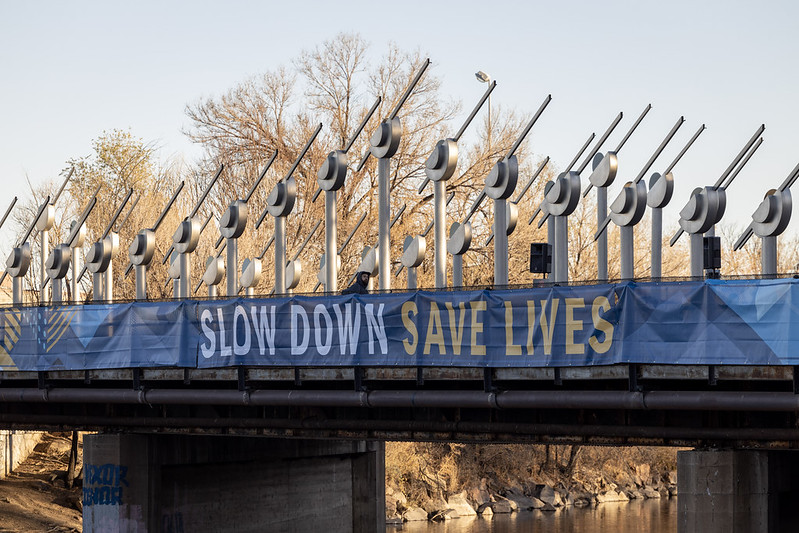Good evening, I am Jill Locantore, Executive Director of the Denver Streets Partnership. Thank you all for coming together this evening with members of the Denver Streets Partnership, Denver City Council, and the Denver Department of Transportation and Infrastructure to honor victims of traffic crashes and their families.
Hopefully, you all got a chance to see the banner art installed on the bridge right here over the Platte River, visible from I-25, that encourages drivers to slow down. The banner was designed by Allison Ramirez of Set Forth Creative. Allison says that the design was greatly inspired by the streets of the city of Denver, itself. The elements within the banner are meant to reflect road signs, crosswalks, skyscrapers, geometric street art, and even the setting the banner is placed in—the bridge and its architecture.
The road we’ve traveled
I want to talk a bit about the road we’ve traveled until today. When we last gathered for World Day of Remembrance in 2019, it had been three years since Denver first declared its commitment to Vision Zero in 2016. During those three years, Denver:
- established the goal of of eliminating traffic fatalities and serious injuries by the year 2030,
- identified more than 70 actions it would take to to move toward that goal,
- and began implementing those actions, including installing sidewalks and bike lanes, lowering speed limits, and adding traffic calming treatments to our streets.
But we were just getting started, and during those three years, more than 200 lives were lost in preventable traffic crashes in Denver. Since 2019, our community has suffered almost unbearable grief and loss, as we have struggled through not only a pandemic, but economic and social upheaval. We have not yet emerged from the pandemic, and yet in some ways we have returned back to our previous ways. Traffic has once again reclaimed our streets, and traffic fatalities are approaching record levels this year. In Denver, we’ve already reached a new high water mark, with weeks left to go in 2021.
Putting people first
We talk a lot about policy and process, but at its heart, Vision Zero is about people.
Since February 17, 2016, the day Denver officially committed to Vision Zero, 378 people have died in preventable crashes. As I share these numbers with you, I am thinking of the faces and the names of these members of our community whose lives were tragically cut short.
I am feeling heartbreak, and exhaustion, and despair.
I also feel hope, particularly as I think back to April of 2020.
That month, our leaders moved quickly and decisively to address an urgent public health crisis, when they called on us to refrain from gathering together indoors. Our leaders also moved quickly to respond to the community’s clear need for more space to get outdoors and safely walk and bike. With little more than orange barricades and clarity of intentions, the City transformed several of our streets into Shared Streets, places that prioritize people over cars.
During that month of April, there weren’t a lot of cars on our streets, but those Shared Streets were full of life. During that month of April, for the first and only time since Denver declared its commitment to Vision Zero, not a single person died in a traffic crash. For that month, for 30 days, we achieved Vision Zero in Denver. During that month of April, our skies were clear and more blue than I had ever seen them before.
When the Denver Streets Partnership asked people how they felt about the Shared Streets, they told us they not only felt a sense of safety, but also joy, and peace, and connection to their neighbors. People told us they felt like the City of Denver had the interests of the residents at heart.
Moving forward, together
There are vaccines and billions of dollars in funding to treat the public health crisis of COVID-19. We must treat the public health crisis of traffic violence with just as much determination. We must recommit to acting swiftly and decisively. We must recommit to acting with clarity of intention and with the resources we have at hand. We must stay focused on what is possible when we reclaim even some of our street space to prioritize people. We must remember that with some sacrifice can come great good.
Lowering our speed limits and changing the design of our streets may mean it takes 30, or 60 seconds longer to drive somewhere, but it is absolutely worth it if it saves the life of a family member, a friend, or a neighbor. Safer streets not only save lives, but they enhance our lives, they bring us joy and peace and connection to each other.
And that is the best possible way we can honor the lives lost in traffic crashes. We can, and we must do this, together, as a community that takes care of each other, especially during these difficult times. Because every month in Denver should be like April 2020, with zero traffic deaths.

